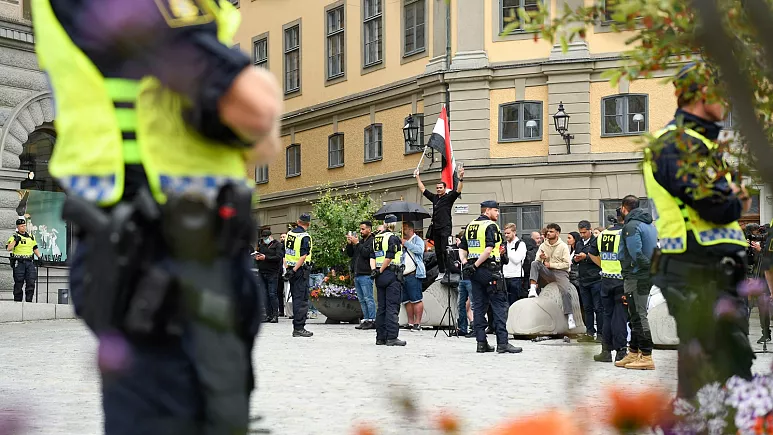
Both Momika and Najem have repeatedly stated that they want the Quran banned completely in the Nordic nation, which has broad free speech laws.
Two men set fire to a copy of the Quran on Monday in front of the Swedish Parliament in Stockholm, in a rally similar to previous events that provoked a diplomatic crisis between Sweden and the Muslim world.
Smiling wryly, Salwan Momika, a 37-year-old Iraqi refugee, and Salwan Najem trampled on a copy of the Koran before setting fire to it, as they had done at the end of June in front of the Swedish capital’s largest mosque.
The rally went off peacefully, with a handful of counter-demonstrators chanting “Allahu-Akbar!”.
Previously, the men had organised another rally on 20 July, in front of the Iraqi embassy in Stockholm, during which they desecrated the sacred book of Islam without burning it.
Both Momika and Najem have repeatedly stated that they want the Quran banned completely in the Nordic nation, which has broad free speech laws which make it possible for people to burn a Quran, or Christian Bible or Jewish Talmud without it necessarily being a crime.
The two men applied to police to stage the event, and said they wanted to “demonstrate in front of parliament and demand the banning of the Quran”.
These desecrations, which have multiplied in recent months in Sweden, have caused tension in the Muslim world.
The Swedish police, who grant permits for gatherings, always insist that they are given in the name of freedom of assembly, stressing that this is not tantamount to approving what might happen there.
It’s an argument that does not seem to be convincing: Saudi Arabia and Iraq have called for an extraordinary meeting of the Organization of Islamic Cooperation (OIC) to deal with the desecration of the Quran in Sweden and Denmark.
In a statement on Monday, Swedish Foreign Minister Tobias Billström explained that he had been in contact with several of his counterparts and stressed that he rejected “any Islamophobic act carried out by individuals”.
But diplomatic tensions are running high: following the desecration of the Quran by Salwan Momika and his acolyte outside the Iraqi embassy in Stockholm, hundreds of Iraqis – mostly supporters of the influential religious leader Moqtada al-Sadr – invaded the Swedish embassy in Baghdad and set fire to it.
The ambassador was expelled from Iraq, and Iran shortly afterwards said it would not accept a new ambassador from the Scandinavian country on its territory.
On Monday, the Iraqi Prime Minister and President both “vehemently condemned the repeated acts of desecration” of the Quran. They called on the countries where these acts took place to adopt “a firmer stance and put an end to these criminal practices”.
The destruction of Islam’s holy book has also “increased the risks for Sweden” and Swedes, noted the kingdom’s Prime Minister Ulf Kristersson in an Instagram post on Sunday.
As a result, 15 administrations, from the armed forces to the tax authorities and the police, have been tasked with “intensifying their work” against terrorism under the aegis of the security services.
In Denmark, where far-right groups have organized several Quran desecrations, the government has announced its intention to introduce measures to limit such events, citing the security problems they entail.
In Sweden, a similar process is under consideration, according to the Prime Minister, who noted that his country was in the “most serious security situation since the Second World War”.
“We know that states, state-like actors and individuals can take advantage” of these events, playing into the hands of extremists and sowing division, Kristersson said in a message on Instagram.
In January, a right-wing extremist had also burned the Quran to denounce Sweden’s bid to join Nato and the negotiations begun with Turkey to this end.
After centuries of non-alignment, this Scandinavian country, like Finland, decided to join the Atlantic Alliance in the wake of Russia’s invasion of Ukraine.




